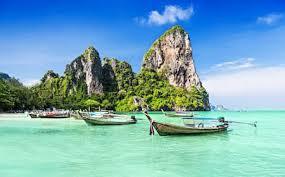Traveling with a Conscience: An Eco-Tourist's Guide to Andaman

The Andaman Islands are a delicate and pristine ecosystem, a natural wonder that captivates every visitor. With its rich marine life, ancient forests, and indigenous tribes, the archipelago is a treasure trove of biodiversity. For a growing number of travelers, a holiday is not just about relaxation but also about leaving a positive impact. If you're passionate about sustainable travel, the Andamans offer a perfect opportunity to explore with a conscience. By choosing the right Andaman Holiday Packages, you can ensure your trip is both unforgettable and environmentally responsible.
Here’s how to embrace eco-tourism in the Andamans.
1. Preserve the Marine Ecosystem
The coral reefs of the Andaman Sea are its crown jewels, but they are also incredibly fragile. Your actions, both in and out of the water, can have a significant impact.
-
Mindful Water Activities: When you go snorkeling or scuba diving, be conscious of your movements. Avoid touching or stepping on corals, as even minor contact can cause damage that takes decades to heal. Choose tour operators who prioritize coral health and provide guidance on responsible diving.
-
Reef-Safe Sunscreen: Many common sunscreens contain chemicals like oxybenzone and octinoxate that are harmful to marine life and coral reefs. Opt for "reef-safe" or "mineral-based" sunscreens to protect the delicate underwater world.
-
Say No to Shells and Corals: It is illegal and highly unethical to collect shells, dead corals, or any other marine souvenirs from the beaches. Shells are an integral part of the coastal ecosystem, providing homes for crabs and other organisms. You can support the local economy by purchasing handcrafted shell-based products from authorized vendors instead.
2. Minimize Your Environmental Footprint
Sustainable travel begins with reducing your own impact, no matter how small.
-
Go Plastic-Free: The Andamans have a strict ban on single-use plastics. Help keep the islands clean by carrying your own reusable water bottle, cloth bags, and reusable cutlery. Many hotels and resorts now have water refill stations, making it easy to stay hydrated without generating plastic waste.
-
Travel Light & Smart: Less weight on ferries and flights means less fuel consumption. Pack light and smart, focusing on essentials. You can also opt for local transport that is more eco-friendly, such as bicycles, which are a popular and delightful way to explore islands like Havelock and Neil.
3. Support the Local Community
Responsible tourism is as much about supporting people as it is about protecting the environment.
-
Choose Local: When booking your trip, look for packages that partner with locally owned hotels, restaurants, and tour guides. This ensures that the money you spend goes directly into the local economy, empowering the community.
-
Buy Local Crafts: Instead of buying mass-produced souvenirs, seek out local markets and shops for handmade crafts. From shell jewelry to intricate wooden carvings, these products are authentic and directly support local artisans and their traditional skills.
-
Respect Tribal Communities: The Andaman Islands are home to some of the world's last remaining indigenous tribes. It is a legal and ethical requirement to respect their privacy. Never attempt to interact with or photograph them, and always adhere to the rules and regulations in protected tribal areas.
4. Engage in Eco-Conscious Activities
Beyond minimizing your impact, you can actively choose activities that contribute to conservation.
-
Mangrove Kayaking: Join a guided kayaking tour through the serene mangrove creeks. These forests are vital to the ecosystem, acting as natural barriers against erosion and providing crucial habitats for wildlife. This activity allows you to appreciate their importance without causing harm.
-
Beach Clean-ups: Some resorts and local organizations hold community beach clean-up drives. Participating in one of these is a rewarding way to give back and help keep the beaches pristine for both locals and future generations of visitors.
By choosing to be a responsible traveler, you not only ensure the preservation of this natural paradise but also deepen your connection to the destination. It's a way of traveling that leaves you with more than just pictures—it leaves you with the satisfaction of knowing you helped protect a truly special place.
- Art
- Causes
- Crafts
- Dance
- Drinks
- Film
- Fitness
- Food
- Spellen
- Gardening
- Health
- Home
- Literature
- Music
- Networking
- Other
- Party
- Religion
- Shopping
- Sports
- Theater
- Wellness



